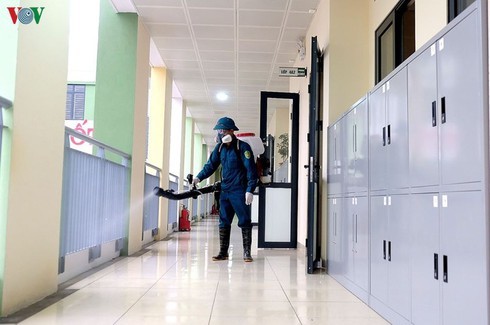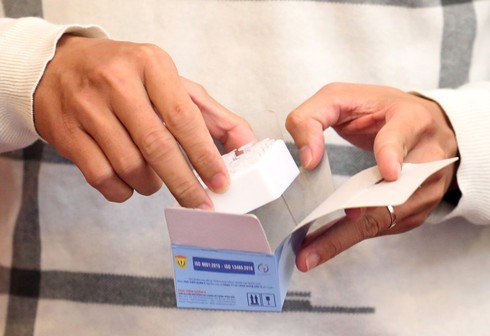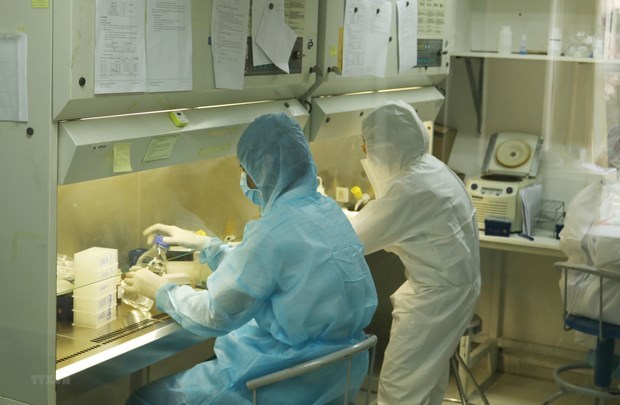 |
|
|
Vietnam has yet to consider the time to declare itself clear of the coronavirus as the risk of infection remains and the pandemic shows no signs of waning globally, according to Deputy Minister of Health Do Xuan Tuyen.
Vietnam has reported no new locally-transmitted coronavirus cases for the past 17 days, said the Ministry of Health in its May 3 update. The total number of confirmed infections remains unchanged at 270, with 217 patients being discharged fro hospital and no deaths recorded.
Having no new cases for more than 10 days does not mean the disease has been eradicated and there is no risk of infection in the community and from outside, said Deputy Minister of Health Do Xuan Tuyen on Tuoitre newswire.
Tuyen, who is also vice chairman of the National Steering Committee on COVID-19 Prevention and Control, said Vietnam has effectively brought the epidemic under control thanks to drastic preventive measures the government has introduced, and if these measures are in place, the second wave of infection is unlikely to rise.
However, he warned there is no room for complacency as there is an existing risk of infection in the community and the rate of infection remains high globally.
He said Vietnam has been repatriating its citizens stranded overseas or wishing to return to the homeland from epidemic-hit areas. In addition, although international commercial flights to Vietnam are not allowed at present, experts and official and diplomatic passport holders enter Vietnam to work. So there is still a risk of new cases that may arise.
The National Steering Committee on COVID-19 Prevention and Control has yet to consider the time to declare Vietnam coronavirus free, affirmed Tuyen.
He advised the people to strictly follow health recommendations, including limiting travel, donning a face mask, keeping a safe distance, avoiding large gatherings in public places, and washing hands with soap or disinfectant solutions when returning home.
Vietnam has capacity to produce COVID-19 testing kits
 |
|
A COVID-19 testing kit made in Vietnam |
By producing a diagnostic kit that is able to detect signs of the novel coronavirus (COVID-19), Vietnam has become one of the few countries in the world to successfully master the technology.
The newly-produced testing kit has recently been recognised by the British Department of Health and Social Care which issued paperwork confirming that the product complies with European standards, along with a certificate of free sale.
The approval will help the Vietnamese COVID-19 test kit to be exported far more easily around Europe, therefore creating opportunities for other Made-in-Vietnam medical diagnostic products to enter the international market.
The COVID-19 test kit has been created after research was conducted by scientists at the Vietnam Military Medical University, and it was produced by the Viet A Technology Joint Stock Company. The kit has been tested for sensitivity, specificity, and accuracy, with the product being similar to the biological kits produced by the US’ Centres for Disease Control and Prevention (CDC) and WHO.
Prof. Dr. Le Bach Quang said the recognition given by Britain for the country’s COVID-19 test kit proves the nation’s scientific level and its ability to master production technologies on the same level as other developed countries globally.
He emphasised that the country is more than capable of exporting medical biological products that have the ability to diagnose diseases early, both infectious diseases and other serious ailments.
Adding to this viewpoint, Trinh Thanh Hung, deputy director of the Science and Technology Department under the Ministry of Science and Technology, noted that the nation’s medical diagnostic kits have been researched and manufactured through strict technology processes and have been made following standard production lines.
Hung went on to advise local medical facilities, research institutes, and enterprises to strive to improve their research capacity, continue to master technology, and invest further in modern production lines in order to realise the export potential of other medical diagnostic products.
Moreover, Hung underlined the importance of participating with relevant ministries to create favourable conditions for testing and licensing domestically-produced items as a means of facilitating the further penetration of Vietnamese products in foreign markets.
Construction worker in Kieu Ky Commune tests negative for SARS-CoV-2
|
|
| Authorities of Gia Lâm District on Friday isolated 120 households in Kiêu Kỵ Commune where the suspected COVID-19 case is living to ensure safety for residents in the area. — Photo tienphong.vn |
The Ministry of Health has confirmed a 28 year-old man, living in Kiêu Kỵ Commune, Gia Lâm District, Hà Nội, tested negative for SARS-CoV-2 on Saturday afternoon.
The man, T. N. K, from Hoàng Mai District in the central province of Nghệ An, is a worker at a construction project in Hà Nội.
He had no history of contact with a suspected COVID-19 case. From April 22, he reported a continuing high fever. On April 26, he was admitted to the Đức Giang General Hospital where he tested positive for dengue. From April 29, his fever worsened and he suffered breathing difficulties. He was transferred to the Hà Nội Heart Hospital where a quick test result was positive for SARS-CoV-2.
He was sent to the National Tropical Diseases Hospital late on May 1 suffering a shortness of breath and exhaustion.
However, his RT-PCR test today was negative for SARS-CoV-2. The patient has been treated following a dengue treatment plan.
Authorities of Gia Lâm District on Friday isolated 120 households in Kiêu Kỵ Commune where the suspected COVID-19 patient is living to ensure safety for residents in the area.
As of Saturday afternoon, Việt Nam has reported no new COVID-19 cases in the community over the past 16 days. The number of coronavirus positive cases still stands at 270, of which 219 have recovered and no deaths have been reported.
No new COVID-19 cases recorded on May 3 morning
Vietnam recorded no new cases of COVID-19 on May 3 morning, making 17 days in a row since April 16 without new infections in the community, according to the National Steering Committee for COVID-19 Prevention and Control.
 |
|
Testing samples for SARS-CoV-2 |
Of the 270 confirmed patients, 130 are imported cases who were quarantined upon their arrival.
Up to 219 patients, or 81 percent, have made full recovery, while 51 others are being treated at medical establishments nationwide.
Twelve patients were tested negative for the novel coronavirus SARS-CoV-2 once and nine others tested negative twice or more.
A total of 30,530 people who had close contact with confirmed patients or coming from pandemic-hit regions have been quarantined across the country, including 246 at hospitals, 5,748 at concentrated quarantine areas and 24,192 at home./.
COVID-19: automatic hand washing machine design contest launched
 |
|
|
The Center of Science and Technology Development for Youth in Ho Chi Minh City on May 2 launched a contest designing automatic antiseptic hand washing machines which will be installed at schools, agencies, and public locations.
The competition aims to promote creativity among youngsters and apply their science-technology products in the COVID-19 fight.
It is designed for Vietnamese citizens at home and abroad aged 11 years and above. Contestants could submit their entries in groups or individually.
They will be divided into three groups. Group A is created for students at secondary, high schools, and vocational training centres. Group B is designed for those from universities, colleges, and academies, while Group C is for young workers and businesspeople.
Entries including registration forms and introduction clips should be sent to email: [email protected] or post office.
There will be three first prizes, three second prizes, three third prizes, and some consolation prizes./.
France aids five Southeast Asian countries in COVID-19 fight
 |
|
Samples for COVID-19 testing at the HCM City Pasteur Institute
|
The French Development Agency (AFD) has announced a grant aid of 2 million EUR (2.19 million USD) for the COVID-19 pandemic response in five Southeast Asian countries, including Vietnam.
In a recent statement, it said the funding will be provided for Vietnam, Cambodia, Laos, Myanmar, and the Philippines to strengthen the COVID-19 surveillance, diagnosis and response systems in the countries.
The AFD noted it hopes the countries’ laboratories will benefit from direct support for the response phase of the COVID-19 epidemic in such aspects as reinforcement of equipment, purchase of diagnostic kits, and acquisition of personal protective equipment./.
COVID-19: Singapore, Laos to ease some social restrictions
Singapore and Laos are moving to ease some restrictions which have been imposed to contain the spread of COVID-19.
Singaporean Health Minister Gan Kim Yong said on May 2 that selected activities such as home-based businesses, laundry services and barbers will be allowed to operate from May 12. Some students will be allowed to go back to schools in small groups from May 19.
Some work premises will be allowed to gradually reopen, taking into account their importance to the economy and supply chains and their ability to minimise risks of transmission.
The city-state with a population of 5.7 million is among the countries with the highest number of infections in Asia, mainly due to outbreaks in cramped migrant workers dormitories. It has managed to curb the spread of the disease among locals outside the dormitories.
The Singaporean ministry reported 932 new COVID-19 cases on May 1, bringing the total confirmed cases there to 17,101. Among them, 1,268 have fully recovered and 1,764 are still under treatment, including 23 in critical condition.
In Laos, after more than one month strict measures against the coronavirus disease were applied, the Lao Government announced the easing of some restrictions on May 1, two days before the social distancing period is over on May 3, so as to gradually bring life back to normal.
In a press conference on May 1, Lao Deputy Prime Minister and Finance Minister Somdy Douangdy said the number of COVID-19 patients in the country remained 19 as of April 30 afternoon, including eight given the all-clear, marking the 19th straight day without new cases in Laos.
This is the basis for the Lao Government to ease some restrictions from May 4 to 17.
For example, state agencies and businesses will be permitted to resume operations with their staff going to the workplace rotationally or working online from home, people can leave their houses and move within the provinces they are living in, and training programmes are allowed to take place in a province but with a limited number of participants.
Meanwhile, some other restrictions will remain in place like the bans on movement to other provinces; entertainment venues, restaurants, cinemas, karaoke and massage lounges, casinos, indoor sports centres and outdoor group sports; and gatherings with more than 10 people.
Deputy PM Somdy Douangdy noted those measures are just temporary, adding in case any provinces or cities in Laos record new COVID-19 cases, the previously applied lockdown and preventive measures will be re-applied strictly in those localities./.
Malaysia to conduct SARS-COV-2 tests for illegal migrants
Malaysia will conduct SARS-CoV-2 tests for undocumented migrants to prevent the spread of COVID-19, Noor Hisham Abdullah, a senior health official, said on May 1.
He added that the local health sector is responsible for ensuring these migrants, whether they are in prion or in containment centres, are free from the infection.
According to Malaysian police, more than 700 migrants were taken into custody including children and Rohingya refugees from Myanmar.
To date, Malaysia has recorded 6,071 COVID-19 cases with over 100 deaths.
Malaysian Prime Minister Muhyiddin Yassin announced on May 1 that the nation will allow a majority of enterprises to resume operations from May 4 and partially ease restrictions imposed to contain the spread of the novel coronavirus SARS-CoV-2.
The Southeast Asian country has not reopened its borders. Inter-state travel will also be banned.
The PM required all people to continue wearing masks, practising social distancing and maintaining high levels of personal hygiene.
He also informed that the Government had lost 63 billion ringgit (14.6 billion USD) from the movement and travel restrictions imposed over six weeks. It will lose another 35 billion ringgit if the restrictions have been extended by a month./.
Thailand recorded six new COVID-19 cases on May 2
 |
| People in Bangkok, Thailand wear face masks to prevent the spread of COVID-19. |
Thailand confirmed six new COVID-19 cases on May 2, bringing the total number of infections nationwide to 2,966.
New daily infections have stayed in the single digit for six consecutive days. The six cases also marked the fewest new daily infections since early March.
Furthermore, no more fatalities have been reported. The death toll remains at 54.
More than 2,730 patients have recovered, while 180 others are being treated at medical facilities.
Earlier, the Thai Government had decided to allow six types of businesses and activities to restart on May 3 as the first step to loosen lockdown restrictions.
Accordingly, markets, food shops outside malls, retail businesses, sport and recreation areas including parks, barber shops, and pet salons and nurseries are allowed to reopen their doors.
They, however, are required to maintain strict standards of hygiene, including frequent hand washing, wearing of masks, and social distancing.
The state of emergency and the ban on sales of alcohol will stay until the end of May./.
